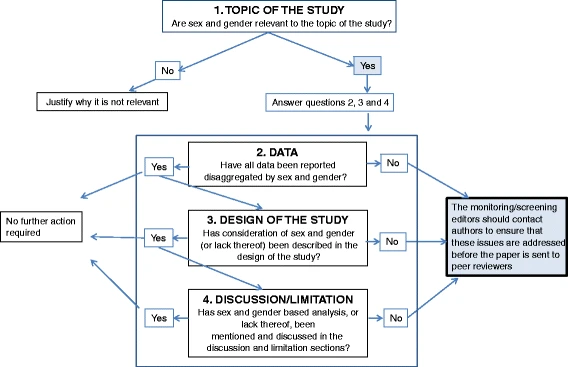By Edna Montero, Alex Mendonça, and Leila Posenato Garcia

Image: National Cancer Institute.
On June 8, 2021, the webinar “Sex and Gender Equity in Research and Publication” was held. The speaker, Dr. Shirin Heidari, is a Senior Researcher at the Graduate Institute of International and Development Studies in Geneva. She is founder of the European Association of Scientific Editors (EASE) Gender Policy Committee, lead author of the SAGER guidelines (Sex and Gender Equity in Research) and founding President of GENDRO, a non-governmental organization with a mission of promoting research and analysis of data with a gender perspective.
The event was promoted by the Brazilian Association of Scientific Editors (Associação Brasileira de Editores Científicos, ABEC Brasil), in partnership with the SciELO Program and the European Association of Scientific Editors (EASE), with the participation of the Forum of Public Health Editors of the Brazilian Association of Public Health (Associação Brasileira de Saúde Coletiva, ABRASCO). The webinar, held with simultaneous translation from English into Portuguese, had a quite large audience.
The following questions were addressed:
- Why do sex and gender matter in research and reporting the results?
- What is the problem with current reporting practices for studies?
- What are the SAGER guidelines and how can they support problem solving?
- What editors, reviewers, and authors can do to improve gender-sensitive reporting?
Initially, Dr. Shirin explained that sex, as a biological factor, and gender, as a social construction that influences norms, power relations, and expectations, have a relevant impact on all dimensions of human life. In scientific research, which aims to improve living and health conditions and promote advances in society, efforts to reduce inequities are essential.
However, many studies are still conducted without considering sex and gender dimensions, which can limit the interpretation of results and mask important differences, which could result in harm to people belonging to a certain sex or gender category. Furthermore, such disregard reduces research reproducibility and rigor, is costly, wastes resources, and leads to lost opportunities for innovation and the achievement of equity.
A very current example presented was the lack of balance in observational and intervention studies on COVID-19, with less female participation in the samples. The exclusive use of mannequins representing men in crash tests was also mentioned, which made cars safer for men, to the detriment of women. In fact, after a car accident, women are at greater risk of sustaining neck injuries and have more serious injuries more often than men. Another example mentioned was Google’s voice recognition tool, which is more accurate for white men and people.
The finding that the lack of reporting of sex and gender characteristics in research is frequent and potentially harmful, combined with the limited use of gender policies in journals, and the perception of a certain resistance by editors, led to the elaboration of the Guidelines on Sex and Gender Equity in Research (SAGER). The SAGER Guidelines, which can be used by authors, reviewers, and editors, provide recommendations and examples to ensure the incorporation of gender and/or gender dimensions in research, and from study design to reporting of results, in all manuscript sections.
The SAGER Guidelines also include a flowchart to guide editors in the initial screening of submitted manuscripts.1
The SAGER guidelines apply to all research with humans, animals or any material originating from humans and animals, as well as to other disciplines whose results will apply to humans, such as mechanics and engineering. Scientific editors, with their recognized role as agents of change, can contribute to greater gender balance in science and publishing practices. Equity and diversity are fundamental to promoting greater quality and transparency, so that science remains at the forefront of innovation.
In line with these principles, ABEC Brazil’s Board of Directors proposed the creation of a working group to address diversity, equity, and inclusion. These themes will also be addressed at ABEC Meeting Live 2021, to be held from September 21st to 24th, 2021. We hope to count on the great participation of the scientific community to deepen this relevant debate. The full event schedule is available at: https://meeting21.abecbrasil.org.br/programacao/
Likewise, the SciELO Program should in the coming months update its document on Criteria, policies and procedures for the admission and permanence of scientific journals in the SciELO Collection with recommendations aimed at introducing practices that foster greater diversity, equity and inclusion in editorial teams and scholarly communication flow of SciELO journals.
Note
HEIDARI, S., et al. Sex and Gender Equity in Research: rationale for the SAGER guidelines and recommended use. Research Integrity and Peer Review [online]. 2016, vol. 1, no. 2, ISSN: 2058-8615 [viewed 5 August 2021]. https://doi.org/10.1186/s41073-016-0007-6. Available from: https://www.equator-network.org/reporting-guidelines/sager-guidelines/
References
BAJOREK, J.P. Voice Recognition Still Has Significant Race and Gender Biases [online]. Harvard Business Review. 2019 [viewed 5 August 2021]. Available from: https://hbr.org/2019/05/voice-recognition-still-has-significant-race-and-gender-biases.
Equidade de sexo e gênero na pesquisa e na publicação. ABEC Brasil on YouTube. 2021 [viewed 5 August 2021]. Available from: https://youtu.be/3hJmiJhXvRw
HEIDARI, S., et al. Sex and Gender Equity in Research: rationale for the SAGER guidelines and recommended use. Research Integrity and Peer Review [online]. 2016, vol. 1, no. 2, ISSN: 2058-8615 [viewed 5 August 2021]. https://doi.org/10.1186/s41073-016-0007-6. Available from: https://www.equator-network.org/reporting-guidelines/sager-guidelines/
PALMER-ROSS, A., OVSEIKO, P.V., and HEIDARI, S. Inadequate reporting of COVID-19 clinical studies: a renewed rationale for the Sex and Gender Equity in Research (SAGER) guidelines. BMJ Global Health [online]. 2021, vol. 6, no. 4, e004997 [viewed 5 August 2021]. http://doi.org/10.1136/bmjgh-2021-004997. Available from: https://gh.bmj.com/content/6/4/e004997
TANNENBAUM, C., et al. Sex and gender analysis improves science and engineering. Nature [online]. 2019, vol. 575, pp. 137–146 [viewed 5 August 2021]. https://doi.org/10.1038/s41586-019-1657-6. Available from: https://www.nature.com/articles/s41586-019-1657-6
External links
Associação Brasileira de Editores Científicos: https://www.abecbrasil.org.br/novo/
GENDRO | Gender in Research: https://www.gendro.org/
Programação – ABEC Meeting Live 2021: https://meeting21.abecbrasil.org.br/programacao/
About Edna Montero
Edna Frasson de Souza Montero is an Associate Professor at Universidade Federal de São Paulo, Associate Professor of General Surgery and Trauma of the School of Medicine, USP and Educational Administrative Technician of Surgical Gastroenterology at Escola Paulista de Medicina – Unifesp. She is a recipient of a Research Productivity Fellowship PQ2 from CNPq and member of the Ethics Committee for Analysis of Research Projects of Hospital das Clínicas, FMUSP. She is Editor-in-Chief of Acta Cirúrgica Brasileira since 2015 e Editor of the Surgical area of Revista da Associação Médica Brasileira. Member of the Directory of ABEC Brasil in the biennium 2020-2021, she holds a certification from the Council of Science Editors.
Sobre Alex Mendonça
Alex Mendonça has a bachelor degree in Digital Media with habilitation in Interafaces Design by Universidade Católica de São Paulo. Since 2014 he is the Coordinator of the Communications Unit at SciELO Brazil, which comprise the SciELO Preprints server, the online manuscript management systems, SciELO website interfaces and SciELO social media.
About Leila Posenato Garcia
Leila Posenato Garcia holds a PhD in Epidemiology by the Universidade Federal de Pelotas. She is a Planning and Research Technician at Instituto de Pesquisa Econômica Aplicada (Ipea), and an acting member at Fundação Jorge Duprat Figueiredo de Segurança e Medicina do Trabalho. She is a deputy member of Health area at the SciELO Brazil Committee, of the European Association of Scientific Editors (EASE) Gender Policy Committee and Coordinator of the Forum of Collective Health Editors of the Brazilian Association of Public Health (ABRASCO), besides being Associate Editor of Revista Brasileira de Saúde Ocupacional (RBSO), and Gaceta Sanitária (Spain).
Translated from the original in Portuguese by Lilian Nassi-Calò.
Como citar este post [ISO 690/2010]:






















Recent Comments